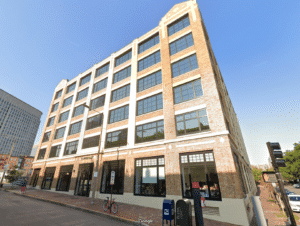In a first for Boston’s office-to-residential conversion program, an office landlord is asking for permission to add height as part of the renovation.
CIM Group, a Los Angeles-based commercial real estate firm that’s been active in the city since 2016, applied Thursday to the city of Boston’s program that bundles 29-year, 75 percent property tax breaks and accelerated approvals for property owners trying to chip away at the city’s pile of unwanted office space and big housing deficit.
At 91 units, the proposed conversion of 95 Berkeley St. in the South End will be the second-biggest to date after KS Partners’ approved 95-unit project in Downtown Crossing.
The company is proposing to add bulk – and therefore height – to its triangular, 107,128-square-foot building just over the Massachusetts Turnpike from the Back Bay business district.
“In order for the contemplated deal to work, CIM Group would need an additional ~20k [gross square feet] of massing to be added to the existing structure,” the company said in its application, yielding 20 more apartments.
Twenty percent of the building’s units would be set aside as affordable housing under the conversion program’s rules. Market-rate rents could start at $3,800, the developer said. Unit mix would be 26 studios, 41 one-bedrooms, 17 two-bedrooms and seven three-bedrooms.
The building’s existing, below-grade, 36-space garage would remain and would be offered to tenants. In addition, a roughly 6,000-square-foot ground-floor retail space would be set aside as a tenant amenity or leased to a retail user.
The building’s only tenant right now is architecture firm Mass Design Group, CIM said in its application.
The conversion would cost around $75 million, CIM noted, inclusive of hard and soft costs, contingencies, potential retail tenant improvements and other fees, but excluding financing costs like interest expenses. The company told Boston officials that it would look to “a combination of equity, debt, and city/state/federal grants or subsidies,” 65 percent of which would likely be debt. However, CIM noted that “traditional financing sources would likely be too costly,” pushing it to seek lower-cost sources of debt like a loan from the federal government.
In an email, a company spokesperson declined to comment beyond statements made its filing.
If approved, CIM’s project would bring the office-to-residential conversion program’s impact up to 307 units, including 62 affordable units, spread across seven buildings totaling 266,182 square feet, a Boston Planning & Development Agency spokesperson said, not all of which are downtown.
Boston’s downtown office vacancy rate ended the first quarter at 16.6 percent, CBRE reported. That’s up from 15.8 percent at the end of 2023. Asking rents declined from $63.39 on a gross basis in the previous quarter to $62.99, a 10 percent drop from a peak in early 2022, although Avison Young reported that landlords are offering additional concessions such as free rent and tenant improvement allowances to fill vacancies in addition to cutting rents. The brokerage is tracking 4.7 million square feet of office leases set to expire by mid-year in Greater Boston.




 |
| 


